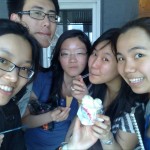Writer’s note: This post is originally submitted as an assignment for my subject, Writing Journalism. Maurice Purnama is a friend of mine from church, and although we share the same last name, we are not blood-related. And Maurice, if you’re reading this, thank you for sharing your thoughts on education with me for one hour over coffee.
INDONESIAN-born-Chinese Maurice Everaldo Purnama has been expected to earn some real money, but earlier this year he suddenly decides to gain Master’s degree in Mechanical Engineering and graduate three years from now at the age of 28.
Having done five-year double degree in Commerce and Engineering, and two-year work in a chemical engineering company, Maurice packs up his comfortable life to once again enter the University of Melbourne’s gates.
With a smile on his face, Maurice says, “I’m doing a three-year cross-discipline course as my background is in chemical engineering.
“Instead of the usual two-year Master, I need to do an extra year for prep. Which means, I’ll be taking second and third year Bachelor subjects again.”
While Asians tend to take pride in graduating as young as possible and to settle down early in life, Maurice has to conquer his pride as he befriends younger peers.
Laughing, and with a hint of irony, Maurice says, “I don’t think you need to ask me how that feels, because even the tutor is one year younger than me.”
While making the decision to go back to uni, Maurice has different responses, where some support him and some do not.
“When I ask my role models, for example my senior in my workplace, they support my decision,” Maurice says.
“But when I talk to my peers, the ones who are in the same level with me, no one can comprehend why I want to go back and do Master. It’s just not the norm.”
Maurice believes that cultural background plays a big role in how you see education. While he is not the only Master student in his class, all the others are Westerners.
“If you are a Chinese, or Australian, your view about education will be different,” Maurice says.
“Asians are more towards efficiency. The sooner you earn, the better.
“On the other hand, Westerners like to take time to find out what they enjoy doing. They take a year break in uni to go travelling; it’s something that Asians never do.”
While Asians tend to go straight to Master after graduation, Maurice says that it’s not how to play the card here in Australia. Experience is the key.
“Until now, when I see people going straight to Master’s degree, I ask, ‘Why?’” Maurice says.
“Employer doesn’t regard the knowledge that you learn from uni, because what’s more important is your work experience in a particular industry.”
That said, Maurice acknowledges how young Asian students are when they graduate, thus making employers unwilling to employ them.
But then in a deeper tone, he says, “Even if you can’t find work, don’t do Master.
“Instead, find other further studies, Honours for example. Because you gain further benefit in doing Master when you have worked before.”
When asked for advice to final year students who haven’t decided what to do next, Maurice pauses, and while folding his hands, he says, “Everyone’s circumstances are different, so never try to pattern yourself to other people’s choices.
“But don’t think only about yourself.
“Think about your future, for your future doesn’t only involve yourself. It involves many other things around you.”









